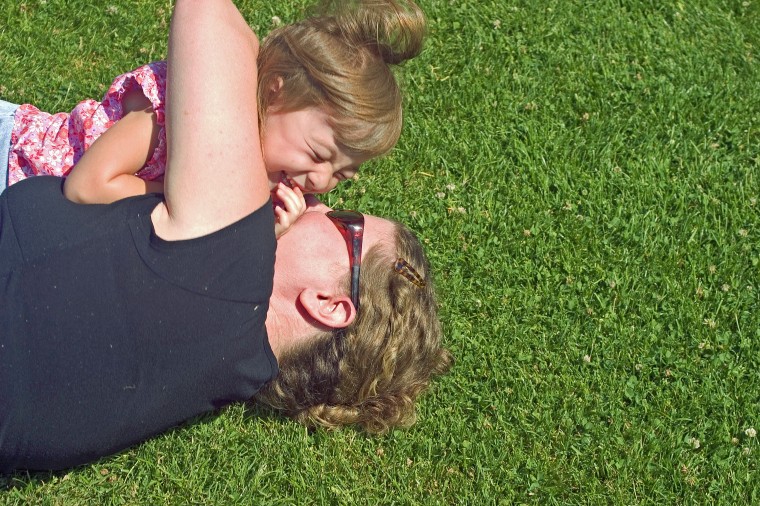One of the key ideas of conventional parenting—the parenting most of us grew up with—is that when a child misbehaves, parents should mete out consequences for bad behavior.
The kinds of consequences we parents favor depend on the culture we’ve grown up in, but we’re all pretty well convinced, when we start out, that a parent needs to exact consequences for a child’s unthinking moments.
But sooner or later, we notice that our children adjust. They decide to ignore the sting of last week’s consequences for bad behavior, so this week, we have to think up something more noxious. One consequence leads to two, and two lead to four. By the time we need outsized measures to influence our child’s behavior, our relationship with our child is spiraling downhill.
For more read this
Connection is more important than things
 There’s a better way to influence our children’s behavior! Consequences—time out, loss of privileges, spanking, “Go to your room,” and “If you do that one more time, I’m going to blow up at you, and you won’t like it one bit,” are all part of a school of thought that puts a lot of faith in how badly children want THINGS. Privileges; toys; a cookie after dinner; a new baseball mitt; a play date with a favorite friend. We hold these out, hoping they’ll influence our children’s behavior, and they might seem to work for a short while.
There’s a better way to influence our children’s behavior! Consequences—time out, loss of privileges, spanking, “Go to your room,” and “If you do that one more time, I’m going to blow up at you, and you won’t like it one bit,” are all part of a school of thought that puts a lot of faith in how badly children want THINGS. Privileges; toys; a cookie after dinner; a new baseball mitt; a play date with a favorite friend. We hold these out, hoping they’ll influence our children’s behavior, and they might seem to work for a short while.
But your child won’t actually gain better judgment on the back of consequences for bad behavior.
You’ll have to set them today, and set them tomorrow again. Your child won’t learn to share, to concentrate on his homework, to clean his room, or to work things out in a dispute with a friend. Instead, he will learn to work your system. That’s not the same as building better judgment.
Good judgment grows slowly
Judgment is a function that develops in the prefrontal cortex. It builds slowly, over time, through experience. Your child possesses good judgment; it’s not perfect because his experience is not yet fully filled in. But somewhere in there, every child has an inborn instinct to share, to cooperate, to organize his affairs, and to listen to and attune to the needs of others. No matter how out of hand your child’s behavior might be at a given moment, deep inside his mind, he knows better. Your consequences will be about as useful to your child as a monkey wrench in moments like these. You can’t get deep into his mind with a monkey wrench, or with a consequence. You can threaten, you can pay out or withhold, but you can’t win your child’s heart or mind. It teaches nothing that reaches deep into the highest function of his mind.
What develops your child’s judgment is experience that goes well. Experience in which he feels safe, respected, and connected. Experience in which he makes choices, and hey! He reaps fun, satisfaction, new discoveries, continued friendship, and connection. Your child needs to feel connected in order to build good judgment.
Connection promotes learning
So when your child is off track, and behaving badly, a sense of connection is what will allow him to learn something new and better than the behavior he’s caught in. Misbehavior tells you that your child doesn’t feel safe, doesn’t feel connected, can’t feel your caring, or his caring either. His access to his good judgment has been blocked.
A well-set limit is needed. You do need to stop his misbehavior, or set out a necessary expectation. But don’t threaten. Don’t cook up a consequence. All that takes extra energy, that won’t yield good results. Get to the point—stop the behavior that’s not working. Bring a limit—actually bring it!
Don’t whine, “I wish you wouldn’t do that! You know that irritates me!” Don’t demand, “Stop that right now! Stop that! I said stop!” When your child feels disconnected, neither orders nor logic will help him reconnect. He feels bad inside. His behavior shows you that. He’s all by himself now. He can’t care about your needs, or your words.
Reach for him. What will begin to touch him is your physical presence. So move in, and gently but effectively stop the behavior that’s not working. Put your hand on his hand, put your arm around his tummy, or block his foot from kicking the window. Then, pay attention. Come close to him, and say little, so his mind can find the bad feeling that’s flooded his mind and has shut down his judgment center.
Bad feelings come out, making room for good decisions
He’ll cry. He’ll squirm or sweat or work himself into a big loud vigorous tantrum. He might laugh. All these results will help clear the feelings that have clouded his judgment so thoroughly. As you listen, he’ll go through a process of clearing that emotional static out of his system. He offloads upset; you listen and connect. No consequence needed. Your limit, or your expectation, and your support are all that’s needed.
Offer your listening. Offer connection. Keep both of you safe from the criticism of others. Don’t insist that he do the right thing right this minute; simply remind him now and then of the thing that needs to be done. He will clear the gunk out of his way, and will cooperate as soon as he can feel your support. Give him the leeway he needs to get his big upset out of his way, so his mind can absorb your love again, your connection at last.
When he’s had all the feelings he needs to have, he will have learned this:
- My mom/dad loves me even when I’m feeling my worst.
- My mom/dad knows I’m good inside, even when I can’t think well.
- My mom/dad will bring me the limits I need, when I need them.
- My mom/dad trusts me to get big feelings out of my way, so I can remember who I love, and who loves me.
- I love to behave well and to think well. That’s the best state of mind in the world!
These are lessons that time out, a spanking, a scolding, or a helping of dessert after dinner can’t teach. These are lessons that build your child’s judgment about thoughtful treatment for human beings. These are lessons that remain for the long haul!
Here’s how it can work:
My daughter, who is 7, didn’t want to go to an annual PTA meeting at our local school. I wanted to go and my neighbor and other close friends who might have been able to have her over to play were also coming to the meeting. My husband was at work. I explained to her that I really wanted to get to the meeting, that she could see some of her friends there, and that there was no one else I could leave her with right now. She said she would only go to the meeting if she could wear a particular dress that had been given to her recently by her grandpa. The dress was woollen and was on the washing line, still wet. I set a limit calmly and lovingly and gently. “I can’t let you wear that dress. It’s wet, and the weather is cold and windy.”
She got upset and said she would not go. I stayed with the limit, “I can’t let you wear that dress.” I felt very calm and clear about setting the limit mainly because I’d just listened to the ‘Setting Limits’ audio recording. I was actually pleased that, given this limit, my daughter could let off some of her feelings about going back to school. I did get distracted a bit by the thought that we were going to be late. I held the limit, she began to cry, and I moved in close. I felt I lost a bit of my focus because it had started to rain, we were outside, the washing was getting wet on the line, and we were going to be late.
But it wasn’t as scary as I thought it might be to hold the limit and to just remain clear and non-negotiable about the limit in that moment. Setting limits in this way is new to me, to be honest. This was not the way limits were set with me (which was more along the slightly permissive/resentment/anger lines). Setting limits like this is a big revelation and a big life skill for me. The outcome was that after some tears and listening my daughter ran upstairs, chose another dress and, somehow, we even made it to the meeting on time.

